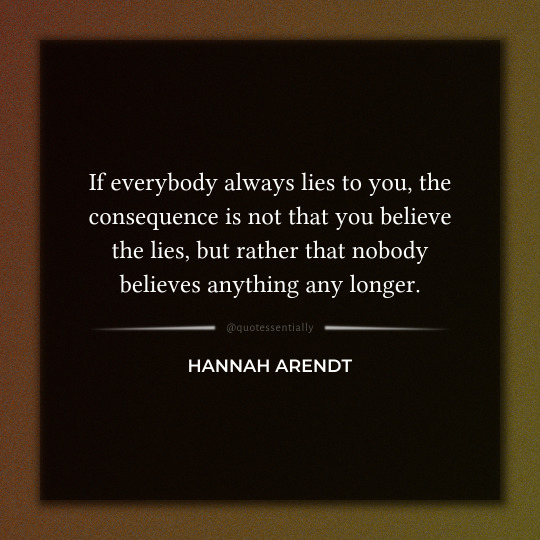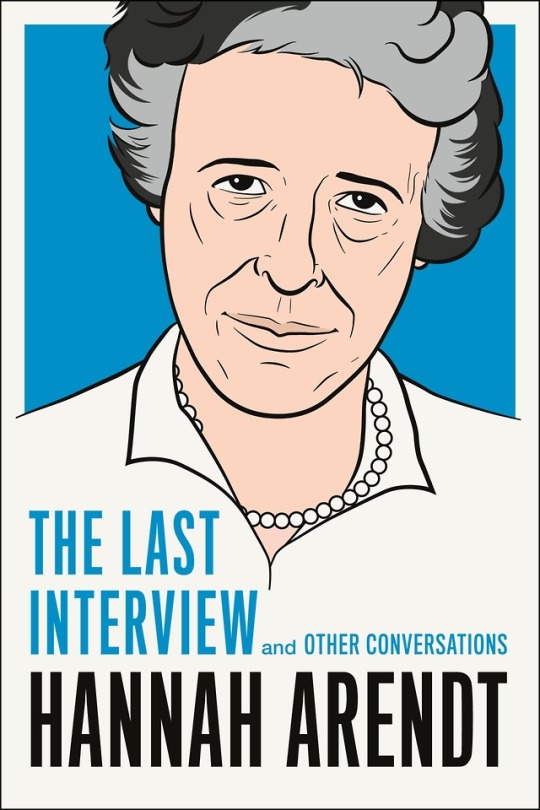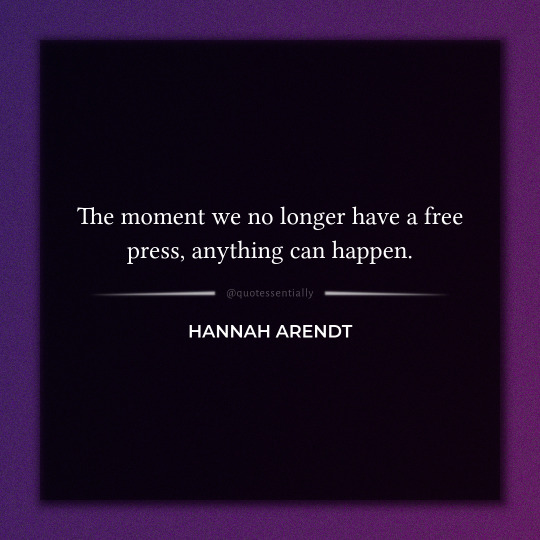#“Interview with Roger Errera”
Quote
Totalitarianism appeals to the very dangerous emotional needs of people who live in complete isolation and in fear of one another.
Hannah Arendt
#Hannah Arendt#arendt#“Interview with Roger Errera”#quotes#life#wisdom#philosophy#politics#totalitarianism#emotional needs#isolation#fear
8 notes
·
View notes
Quote
This is the real problem of every philosophy of history: how is it possible that in retrospect it always looks as though it couldn’t have happened otherwise?
Hannah Arendt, "Interview with Roger Errera", The New York Review of Books (26 October 1978)
196 notes
·
View notes
Photo

Snow in Hollywood :: [Ian Bremmer]
* * * *
“The law of progress holds that everything now must be better than what was there before. Don’t you see if you want something better, and better, and better, you lose the good. The good is no longer even being measured.”
— Hannah Arendt, “Interview with Roger Errera”, The New York Review of Books (26 October 1978)
22 notes
·
View notes
Text

From Hannah Arendt’s “Interview with Roger Errera” in The New York Review of Books, (26 October 1978)
9 notes
·
View notes
Photo

"The moment we no longer have a free press, anything can happen. What makes it possible for a totalitarian or any other dictatorship to rule is that people are not informed; how can you have an opinion if you are not informed? If everybody always lies to you, the consequence is not that you believe the lies, but rather that nobody believes anything any longer.
This is because lies, by their very nature, have to be changed, and a lying government has constantly to rewrite its own history. On the receiving end you get not only one lie -- a lie which you could go on for the rest of your days -- but you get a great number of lies,
depending on how the political wind blows. And a people that no longer can believe anything cannot make up its mind. It is deprived not only of its capacity to act but also of its capacity to think and to judge. And with such a people you can then do what you please."
-- Hannah Arendt
(1906-1975) German-American political theorist, escaped Nazi Germany
Source: 'Hannah Arendt: From an Interview' Comments made in 1974 during an interview with the French writer Roger Errera and published in October 26, 1978 issue of The NewYork Review of Books
7 notes
·
View notes
Text
The moment we no longer have a free press, anything can happen. What makes it possible for a totalitarian or any other dictatorship to rule is that people are not informed; how can you have an opinion if you are not informed? If everybody always lies to you, the consequence is not that you believe the lies, but rather that nobody believes anything any longer.
This is because lies, by their very nature, have to be changed, and a lying government has constantly to rewrite its own history. On the receiving end you get not only one lie — a lie which you could go on for the rest of your days — but you get a great number of lies, depending on how the political wind blows. And a people that no longer can believe anything cannot make up its mind. It is deprived not only of its capacity to act but also of its capacity to think and to judge. And with such a people you can then do what you please.
Hannah Arendt, Interview with French writer Roger Errera, 1974. New York Review of Books.
6 notes
·
View notes
Text
“The moment we no longer have a free press, anything can happen.”
- Hannah Arendt, “Interview with Roger Errera”, The New York Review of Books (26 October 1978)
via @philosophybits
31 notes
·
View notes
Text
No momento em que não temos mais uma imprensa livre, tudo pode acontecer.
Hannah Arendt, "Interview with Roger Errera", The New York Review of Books (26 October 1978)
4 notes
·
View notes
Text
“The moment we no longer have a free press, anything can happen.”
- Hannah Arendt, “Interview with Roger Errera”, The New York Review of Books (26 October 1978)
1 note
·
View note
Photo

Hannah Arendt: The Last Interview and Other Conversations - https://bit.ly/2GDNYHa - free delivery worldwide
Arendt was one of the most important thinkers of her time, famous for her idea of "the banality of evil" which continues to provoke debate. This collection provides new and startling insight into Arendt's thoughts about Watergate and the nature of American politics, about totalitarianism and history, and her own experiences as an émigré.
Hannah Arendt: The Last Interview and Other Conversations is an extraordinary portrait of one of the twentieth century's boldest and most original thinkers. As well as Arendt's last interview with French journalist Roger Errera, the volume features an important interview from the early 60s with German journalist Gunter Gaus, in which the two discuss Arendt's childhood and her escape from Europe, and a conversation with acclaimed historian of the Nazi period, Joachim Fest, as well as other exchanges.
These interviews show Arendt in vigorous intellectual form, taking up the issues of her day with energy and wit. She offers comments on the nature of American politics, on Watergate and the Pentagon Papers, on Israel; remembers her youth and her early experience of anti-Semitism, and then the swift rise of the Hitler; debates questions of state power and discusses her own processes of thinking and writing. Hers is an intelligence that never rests, that demands always of her interlocutors, and her readers, that they think critically. As she puts it in her last interview, just six months before her death at the age of 69, "there are no dangerous thoughts, for the simple reason that thinking itself is such a dangerous enterprise."
Hannah Arendt: The Last Interview and Other Conversations - https://bit.ly/2GDNYHa - free delivery worldwide
The Portable Hannah Arendt: https://bit.ly/2JC0sCA - free delivery worldwide
1 note
·
View note
Quote
The law of progress holds that everything now must be better than what was there before. Don’t you see if you want something better, and better, and better, you lose the good. The good is no longer even being measured.
Hannah Arendt, from the interview with the French writer Roger Errera in “The New York Review Of Books” (1974)
3 notes
·
View notes
Text
L'Amérique n'est pas un État-nation. Le Québec non plus. Partie 1.
L’Amérique n’est pas un État-nation. Le Québec non plus. Partie 1.
Interrogée par l’écrivain politique français Roger Errera, dans une interview réalisée à New York en 1973, pour donner ses premières impressions sur son pays d’accueil, la philosophe et penseuse politique Hanna Arendt a répondu sans détour que l’Amérique n’était tout simplement pas un État-nation[1]. Contrairement aux Européens, les Américains ne sont unis par aucun héritage commun, ni par la…

View On WordPress
0 notes
Quote
A people that no longer can believe anything cannot make up its mind. It is deprived not only of its capacity to act but also of its capacity to think and to judge. And with such a people you can then do what you please.
Hannah Arendt, "Interview with Roger Errera", The New York Review of Books (26 October 1978)
#philosophy#quotes#Hannah Arendt#The New York Review of Books#totalitarianism#authoritarianism#truth#lies#thought#judgment#oppression
264 notes
·
View notes
Photo

Ospreys--SILENCED!, Dyke Marsh Wildlife Preserve, Alexandria, VA, June 16, 2015
“The liberty of the press is essential to the security of freedom in a state: it ought not, therefore, to be restrained in this commonwealth.”
John Adams, Samuel Adams, James Bowdoin (1780). Constitution of the Commonwealth of Massachusetts. Commonwealth of Massachusetts. pp. Article XVI.Text
“The moment we no longer have a free press, anything can happen. What makes it possible for a totalitarian or any other dictatorship to rule is that people are not informed; how can you have an opinion if you are not informed? If everybody always lies to you, the consequence is not that you believe the lies, but rather that nobody believes anything any longer. This is because lies, by their very nature, have to be changed, and a lying government has constantly to rewrite its own history. On the receiving end you get not only one lie—a lie which you could go on for the rest of your days—but you get a great number of lies, depending on how the political wind blows. And a people that no longer can believe anything cannot make up its mind. It is deprived not only of its capacity to act but also of its capacity to think and to judge. And with such a people you can then do what you please.”
Hannah Arendt, Hannah Arendt: From an Interview. Comments made in 1974 during an interview with the French writer Roger Errera and published in October 26, 1978 issue of The NewYork Review of Books Interview. Copyright © 1978 Mary McCarthy West, Trustee. Archived via Wayback Machine of the Internet Archive on February 22, 2017
#osprey#Trump White House Bars News Organizations From Press Briefing#freepress#democracyessential#birding#original photography#tumblr
46 notes
·
View notes
Photo

From Hannah Arendt’s “Interview with Roger Errera” in The New York Review of Books, (26 October 1978)
35 notes
·
View notes
Quote
Nobody knows what he is doing because the future is being done, action is being done by a 'we' and not an 'I.' Only if I were the only one acting could I foretell the consequences of what I’m doing. What actually happens is entirely contingent, and contingency is indeed one of the biggest factors in all history.
Hannah Arendt, "Interview with Roger Errera", The New York Review of Books (26 October 1978)
#philosophy#quotes#Hannah Arendt#The New York Review of Books#past#present#future#actions#consequences#contingency#history
204 notes
·
View notes